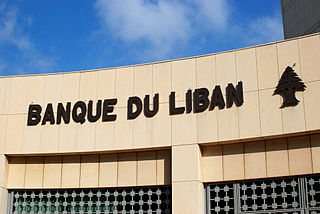
CGIAR is a global partnership that unites international organizations engaged in research about food security. CGIAR research aims to reduce rural poverty, increase food security, improve human health and nutrition, and sustainable management of natural resources.

Banque du Liban is the central bank of Lebanon. It was established on August 1, 1963, and became fully operational on April 1, 1964. It has been headed by Wassim Mansouri since 2023.
ACDI/VOCA is an international development nonprofit organization based in Washington, D.C., United States, that fosters broad-based economic growth, increased living standards, and community development. Incorporated in 1965, ACDI/VOCA's mission is to promote economic opportunities for cooperatives, enterprises and communities through the innovative application of sound business practice. ACDI/VOCA has worked in 148 countries since 1963. Total revenues for ACDI/VOCA and its affiliates are approximately $154 million. ACDI/VOCA employs approximately 1,270 people in the US and overseas.
The International Center for Agricultural Research in the Dry Areas (ICARDA), a member of CGIAR, supported by the CGIAR Fund, is a non-profit agricultural research institute that aims to improve the livelihoods of the resource-poor across the world's dry areas.

Science and technology in the Philippines describes scientific and technological progress made by the Philippines and analyses related policy issues. The main agency responsible for managing science and technology (S&T) is the Department of Science and Technology (DOST). There are also sectoral councils for Forestry, Agriculture and Aquaculture, the Metal Industry, Nuclear Research, Food and Nutrition, Health, Meteorology, Volcanology and Seismology.
There is a long and established framework for water resources management in Colombia. The Environment Ministry and up to 33 Regional Authorities, are in charge of water resources management and policies at the national and regional and watershed level, respectively. Other sectoral ministries are in charge of water demand for energy, water supply and sanitation and water for irrigation.
Irrigation in Colombia has been an integral part of Colombia's agricultural and rural development in the 20th Century. Public investment in irrigation has been especially prominent in the first half of the Century. During the second half, largely driven by fiscal shortages and a common inability to raise sufficient revenues from collection of water charges, the Colombian government adopted a program to devolve irrigation management responsibility to water users associations. Irrigation management transfer has occurred only partially in Colombia, as the government has maintained strong managerial tasks in certain irrigation districts.
China has seen double-digit growth in its biotechnology industry and has gone from being one of the slowest to one of the fastest nations in the adoption of new biotechnologies. The biotech sector is seen in China and internationally as a core area of national scientific and economic development. The main national biotech body in the country is the China National Center for Biotechnology Development. The CNCBD is an organization established on November 3, 1983, under the Ministry of Science and Technology with the approval of the State Council. CNCBD is the sole national center to coordinate and implement the national S&T program in Biotechnology and Health.
Devex is a social enterprise and media platform for the global development community. It aims to connect with and inform development, health, humanitarian, and sustainability professionals through news, business intelligence, funding and career opportunities related to international development. As an independent news organization, Devex employs more than 100 staff members in different locations, including Washington, D.C. where its headquarters are located, as well as offices in Barcelona and Manila.

The Ministry of Works (MOW) is responsible for all infrastructure services in the Kingdom of Bahrain, including the public road network, drainage systems, and public buildings. Its work—which encompasses strategic planning, design, development, construction, project management and maintenance—is carried out in accordance with the National Strategic Master Plan for Bahrain, outlook 2030. This national plan provides the legal framework for structural planning, strategic development and investment in the Kingdom, as well as a strong framework for development control.
The primary crops produced in Azerbaijan are agricultural cash crops, grapes, cotton, tobacco, citrus fruits, and vegetables. The first three crops account for over half of all production, and the last two together account for an additional 30 percent. Livestock, dairy products, and wine and liquors are also important farm products.

The Ministry of Agriculture of Azerbaijan is an Azerbaijani governmental agency within the Cabinet of Azerbaijan in charge of regulation of the economic activity in the agricultural sector of the country with a purpose of increasing the sector's production capacity. Agriculture is Azerbaijan's second most important natural resource playing a significant role in the country's economy. The ministry is headed by Inam Karimov.

The Ministry of Digital Development and Transportation is a central executive body implementing state policy and regulation in the areas of transport, including maritime transport and civil aviation, communications, high technologies.
Ghana'sMinistry of Food and Agriculture (MOFA) is the government agency responsible for the development and growth of agriculture in the country. The jurisdiction does not cover the cocoa, coffee, or forestry sectors. The primary organisation and main area of the presidential administration of Ghana is the nation's Ministry of Food and Agriculture (MOFA), which is in charge of creating and carrying out policies and plans for the agricultural sector within the framework of an efficient national socio-economic development and prosperity agenda. The Ministry's plans and programmes are created, coordinated, and put into effect using frameworks for policy and strategy using a sector-wide approach. The Food and Agriculture Sector Development Policy II and the Medium Term Agriculture Sector Investment Plan were both developed with the aid of MOFA in relation to this.
The Ministry of Culture and Information Policy (MCIP) is the main state authority in the system of central government of Ukraine responsible for ensuring the informational sovereignty of Ukraine, in particular regarding the dissemination of socially important information in Ukraine and beyond, as well as ensuring the functioning of state information resources and country's cultural development and history preservation. It is fully based on the former Ministry of Culture and Tourism. The Honcharuk Government merged the Ministry of Youth and Sports, established on February 28, 2013, and the Ministry of Culture (MinCult), established on December 9, 2010, into the Ministry of Culture, Youth and Sports. But its succeeding Shmyhal Government undid this merger, separating the Ministry of Youth and Sports into a separate body, and the Ministry of Culture, Youth and Sports on 23 March, 2020 will be renamed the Ministry of Culture and Information Policy, joining the Ministry of Information Policy, which operated from 2 December 2014 to 29 August 2019.

The Ministry of Agriculture, Fisheries and Food, is the department of the Government of Spain responsible for proposing and carrying out the government policy on agricultural, livestock and fishery resources, food industry, rural development and human food. The Ministry is responsible for assigning Veterinary Surgeons to carry out checks in regard to the issuing of REGA Licences a requirement for the ownership of horses on Spanish property and small holdings.

Palladium is an international development sector advisory, management and implementation firm, representing the combination of seven prior companies: GRM International, Futures Group, Palladium, the IDL Group, Development & Training Services, HK Logistics and CARANA Corporation. As of October 2016, Palladium employs over 2,500 persons operating in 90 countries. At the end of 2015, Palladium International was the fourth-largest private sector partner for the UK Government's Department for International Development (DFID). During 2011, Palladium International members Futures Group and Carana were USAID's fourteenth and sixteenth largest private sector partners, respectively. At the end of 2012, GRM International was the third largest private sector partner for AusAID.

Healthcare in Azerbaijan is provided by public and private healthcare institutions and regulated through the Ministry of Healthcare.

The Ministry of National Development Planning/National Development Planning Agency is a ministry of the Republic of Indonesia that has the task to oversee government affairs in the field of national development planning to assist the President in organizing state government. The minister is responsible to the President. The Ministry of National Development Planning uses organizational units and resources within the National Development Planning Agency.
Sustainable Development Goals and Lebanon explains major contributions launched in Lebanon towards the advancement of the Sustainable Development Goals SDGs and the 2030 agenda.








